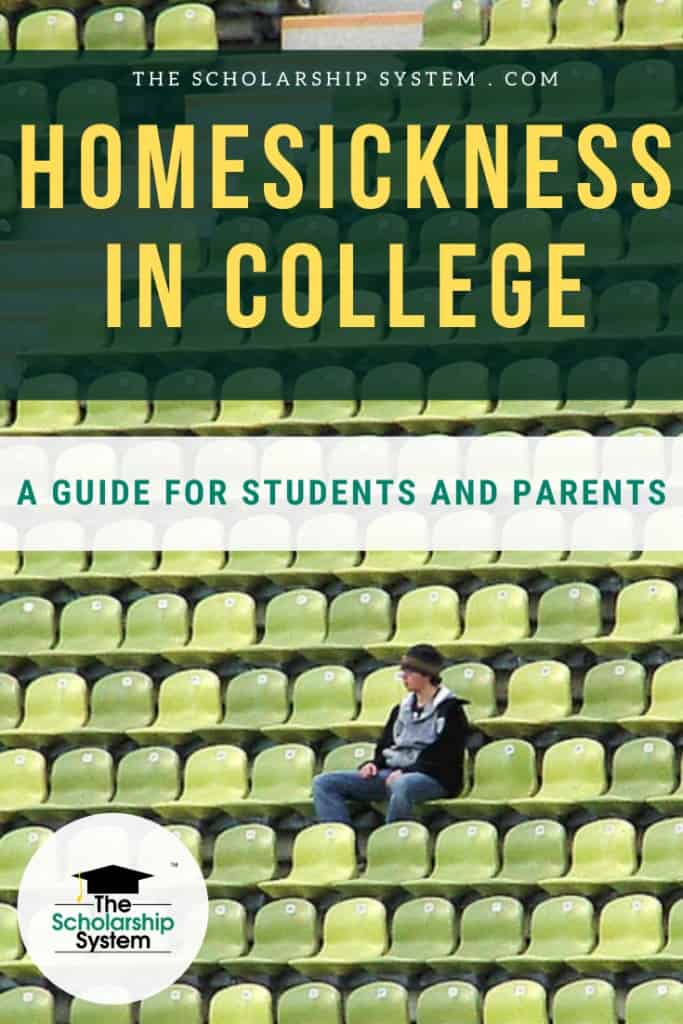Updated on April 28th, 2025
Homesickness in college students is relatively common. When a student first strikes out on their own, they may feel excited about launching their life as an adult, but it’s also completely normal to feel homesick and experience a range of other emotions, including anxiety about what the future holds or missing their families.
When negative feelings are strong, students might long for their old life at home. For students, this can be incredibly distressing, potentially leading to anxiety, depression, or other emotional states. For parents, knowing that your student is feeling homesick can be heartbreaking, particularly if you don’t know how to help.
Here’s a look at what homesickness in college is, the signs of homesickness in students, and tips for students and parents that can make the college journey and overcoming homesickness easier.
If you and your student want to learn more about where to find local scholarships, as well as national awards, sign up for our free college scholarship webinar! Take a trip over to http://thescholarshipsystem.com/freewebinar to reserve your spot today.
Contents
Introduction to College Life
College life is a significant milestone in a student’s journey, filled with new experiences, challenges, and opportunities for personal growth. As students embark on this new chapter, they may encounter a mix of emotions, including excitement, anxiety, and a sense of feeling homesick. It’s crucial to acknowledge that feeling homesick is a normal part of adjusting to college life, and it’s essential to develop coping strategies to overcome it. By joining clubs, organizations, and engaging in campus activities, students can enhance their sense of belonging, meet new peers, and build a strong foundation for their future. In this section, we will explore the causes of homesickness, self-care strategies, and the importance of seeking help when needed.
What Is Homesickness in College?
Homesickness is a term used to describe the emotional and mental distress that can occur when someone is separated from home. In this sense, “home” doesn’t necessarily mean a physical building. Instead, it can encompass a range of things that make an area feel comfortable, such as specific people, a standard of living, a routine, or a sense of familiarity.
In college students, homesickness can occur when they choose to go away to college. Not only is the physical environment new, so is the culture. This can be a shock, as the way of life in their new home is unfamiliar and might be dramatically different from their family culture. Plus, unless they head to their new school with friends, their support systems might not be local, making them feel alone.
Ultimately, homesickness in many college students occurs because heading to school is a significant life transition, and that isn’t always easy to navigate. It’s a reality that many students face as they adjust to their new environment.
Causes of Homesickness
Homesickness is often triggered by the stress of adjusting to a new environment, leaving behind familiar surroundings, and separating from loved ones. It can be caused by a combination of factors, including anxiety, uncertainty, and a sense of disconnection from family and friends. Understanding the causes of homesickness can help students develop effective coping strategies and seek support when needed. By recognizing the signs of homesickness, such as feelings of loneliness, sadness, and nostalgia, students can take proactive steps to manage their emotions and enhance their overall well-being.
Signs of Homesickness
When a student is experiencing homesickness while at college, it usually shows. While some students may come right out and say they are experiencing those feelings, others may not be so forthcoming. By understanding what the symptoms of homesickness are, you can increase your chances of spotting it.
The signs of homesickness can vary from one student to the next. However, certain indications are more common in college freshmen, including:
- Anxiety
- Depression
- Feeling like they don’t fit in
- Decreased motivation
- Loneliness
- Sadness
- Irritability
- Longing for a connection with someone
- A sense of grief or loss
Essentially, being a homesick college student is distressing, and it can negatively impact their lives. For example, they may skip classes because they feel too sad or depressed to attend or could struggle to remain focused, causing their grades to tumble. Avoiding social activities or isolating themselves are also potential signs of homesickness.
It’s important to understand that the signs of homesickness in college above can also be symptoms of other health conditions, including some that are potentially serious. Telling the difference between homesickness and other conditions, particularly depression, isn’t easy, so you don’t want to assume that homesickness is the root cause. If you or your student is struggling with any of the emotions above, it’s wise to seek guidance from a medical professional. They can help identify the underlying cause and create a treatment plan to address the health issue.
How to Deal with Homesickness in College
Dealing with homesickness doesn’t seem like an easy task, particularly the first few weeks if it leaves a student feeling sad and unmotivated. However, that doesn’t mean it can’t be overcome.
Above all else, understand that the feelings a homesick college student feels are normal, and there is hope that these feelings will subside as they adjust to their new environment. Many students experience it in the first semester as they adjust, so students aren’t alone in this struggle.
In many cases, figuring out how to cure homesickness is mostly about taking actions that allow the campus to feel like home. Typically, this involves increasing a student’s comfort level with the area and building a suitable support system.
If you are trying to figure out what to do when homesick so that you can feel better, here are some tips.
Personalize Your Space
When a space feels like you, it’s almost always more comfortable. When you decorate your dorm room, make sure you bring items that feel familiar. These can include decorations, pictures, bedding, knickknacks, or anything else that makes you happy and helps you personalize your space.
Get Involved on Campus
By getting involved on campus, you are creating opportunities to become more familiar with your environment and make new friends. Since knowing your local area can make you more comfortable, fully exploring your college campus is wise. Plus, by joining in on activities, you can familiarize yourself with the culture, and that makes a difference, too.
Getting to know other students is also essential. By cultivating a social circle, you are forging a local support system. If you look for clubs, study groups, or other gatherings that focus on your areas of interest, you can find like-minded individuals who enjoy what you do. By joining clubs, you can build connections that can turn into friendships, making college life on your campus feel more like home.
Keep in Touch with Loved Ones
Staying in touch with friends and family back home is important. Schedule regular phone calls, connect on social media or otherwise find ways to keep up with everyone’s lives and to tell them about yours. That way, you can maintain this support system.
Just make sure you don’t spend too much time visiting your loved ones. If you leave campus at every opportunity, you might have a harder time establishing the school as your new home, making your homesickness worse instead of better.
Talk About Your Feelings
A lot of students and international students are probably dealing with the same feelings of homesickness you are experiencing. By talking about it and putting your feelings into words, you can more easily process your emotions. Plus, you’ll learn pretty quickly that you aren’t alone and might be able to craft stronger bonds that lead to friendships.
Discussing your feelings also ensures you aren’t ignoring them. Bottling up what you’re going through usually makes the situation worse, not better, so find a way to express them.
If you are having difficulty figuring out how to deal with homesickness as a college student, it’s best to get help from a medical professional. Mental health services can be incredibly beneficial. Plus, if homesickness is a symptom but not the root cause of the issue, a medical professional can help identify the core condition and develop a proper treatment plan.
Self Care for College Students
Self-care is essential for college students to maintain their physical and mental health. Engaging in regular exercise, such as visiting the gym or participating in sports, can help reduce stress and anxiety. Practicing mindfulness, meditation, and deep breathing exercises can also help students manage their emotions and stay focused. Additionally, getting enough sleep, eating a balanced diet, and staying hydrated are crucial for maintaining energy levels and overall well-being. By prioritizing self-care, students can enhance their mood, reduce feelings of homesickness, and improve their academic performance.
How to Help Someone Who is Homesick
As a parent or family member, it may seem like helping a homesick college student is simple. You might be tempted just to have them come home, as that looks like a logical solution. In other cases, you might think that frequent visits are a great option. However, in both scenarios, that isn’t always the best approach.
If your student comes home too often or you visit too much, your student might be less likely to develop a support system at school. This can make the situation worse, not better. Similarly, if they visit you regularly, they might not view their college as their new home, and that can also make their transition more challenging.
Instead, you want to focus on being supportive, reassuring, and encouraging without being too present, ensuring that your student is on the right track academically and socially. It’s a tricky balance, but it might yield the best results.
Offer the Homesick Student Support
If you are trying to figure out what to say to someone who is homesick at college, focus on giving supportive and practical advice. Listen to your student’s concerns, first and foremost. That way, you can identify areas where your student is struggling, allowing you to focus your response in the right areas.
Next, you can make recommendations that help them turn their college into their home. You might want to suggest they participate in social activities to help them build a strong social circle or sign up for activities that they enjoy. You might help them evaluate clubs on campus or encourage them to join study groups. Advising them to keep an eye on bulletin boards to learn about events is also wise.
Encourage Exploration
For many freshmen college students, the school itself isn’t the only new environment they are facing; they’re in a new town, too. Living in a new city can be intimidating. Plus, if they are experiencing stress in other areas of their lives (like challenging classes), their negative feelings might amplify the sense that they don’t belong.
If your student is struggling, encouraging them to explore their new city can be a good idea. This can include getting to know their campus, finding the best restaurants for lunch, or learning where the best park is so that they can thoroughly enjoy a sunny day. Encouraging them to take moments to explore their new city can help them get comfortable with their new surroundings.
As they get comfortable with their new surroundings, it’s easier for the student to take ownership of their new home. This can potentially make dealing with homesickness easier.
Be Reassuring
As you speak with your student, make an effort to be reassuring. Let your student know that homesickness is common and, to a degree, normal on occasion. Remind them that others around them likely have these feelings, too, and that they aren’t alone in experiencing the ups and downs of adjusting to college life.
You can also tell your student that these emotions tend to diminish with time. As they get to know their new home, get active on campus, and build a social circle, they will likely start to feel better. Encourage them to focus on the positive aspects of their college experience and to cultivate the relationships they need to have a suitable amount of local support.
Recommend Getting Help
If your student’s homesickness symptoms are significantly interfering with their daily life, it’s wise to recommend they get help from a medical professional. This is especially true as the signs of homesickness can also be symptoms of serious health conditions, including major depression.
Most campuses have services for students, including some for mental health. Ignoring depression or other mental health concerns can have severe consequences, so it’s always best to recommend your student seek out help if they are struggling to figure out how to get rid of homesickness or other negative emotions.
Counseling Services and Support
Counseling services and support are available to help students cope with homesickness and other challenges. Talking to a counselor or therapist can provide students with a safe and confidential space to discuss their feelings and develop coping strategies. Support groups and peer counseling can also offer a sense of community and connection, helping students feel less isolated and more supported. By seeking help and guidance, students can overcome homesickness and achieve success in their academic and personal lives.
From Struggle to Strength: Your Path Ahead
Homesickness is a common experience for many college students, but it can be overcome with the right mindset, support, and coping strategies. By recognizing the causes of homesickness, prioritizing self-care, and seeking help when needed, students can enhance their overall well-being and achieve success in their academic and personal lives. Remember, feeling homesick is a normal part of the college experience, and it’s okay to ask for help. By staying positive, focused, and committed to their goals, students can overcome homesickness and thrive in their new environment. As you navigate your college journey, keep in mind that it’s a chance to grow, learn, and discover new things about yourself and the world around you. With the right support and mindset, you can overcome homesickness and make the most of your college experience.
If you and your student want to learn more about where to find local scholarships, as well as national awards, sign up for our free college scholarship webinar! Take a trip over to http://thescholarshipsystem.com/freewebinar to reserve your spot today.









Leave a Reply